Employee Performance Enhancement: A Study on Reward Systems at IHT UK
VerifiedAdded on 2020/02/03
|61
|19012
|70
Report
AI Summary
This report investigates the effectiveness of reward systems in enhancing employee performance, specifically focusing on the Intercontinental Hotel Group (IHT) in the UK. The study explores the significance of reward systems, their link to employee performance, and identifies strategies to improve employee outcomes. The research utilizes a qualitative approach, gathering primary data from hotel employees through simple random sampling and secondary data from literature reviews. Findings highlight the importance of both monetary and non-monetary rewards in boosting employee motivation, retention, and service quality. The report examines various reward types, including fringe benefits, promotions, and financial incentives, and their impact on employee satisfaction and business performance. The conclusion emphasizes the need for effective reward policies to retain skilled employees and enhance overall business success. The report provides recommendations for IHT to optimize its reward system and improve employee performance, ultimately contributing to the company's long-term growth and competitiveness in the market. The study also highlights the challenges faced by the hotel industry, such as high employee turnover and the importance of addressing these issues through effective reward strategies.
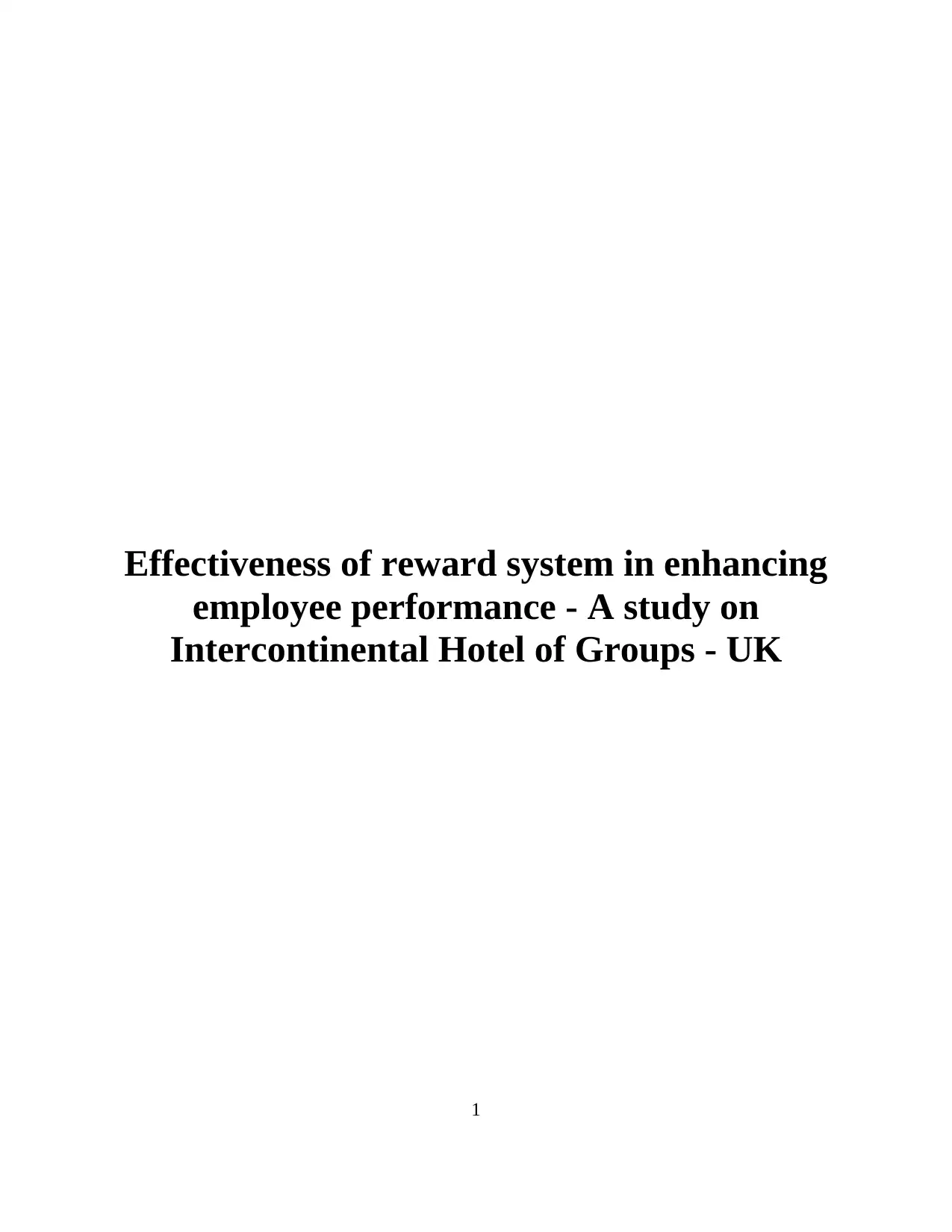
Effectiveness of reward system in enhancing
employee performance - A study on
Intercontinental Hotel of Groups - UK
1
employee performance - A study on
Intercontinental Hotel of Groups - UK
1
Paraphrase This Document
Need a fresh take? Get an instant paraphrase of this document with our AI Paraphraser
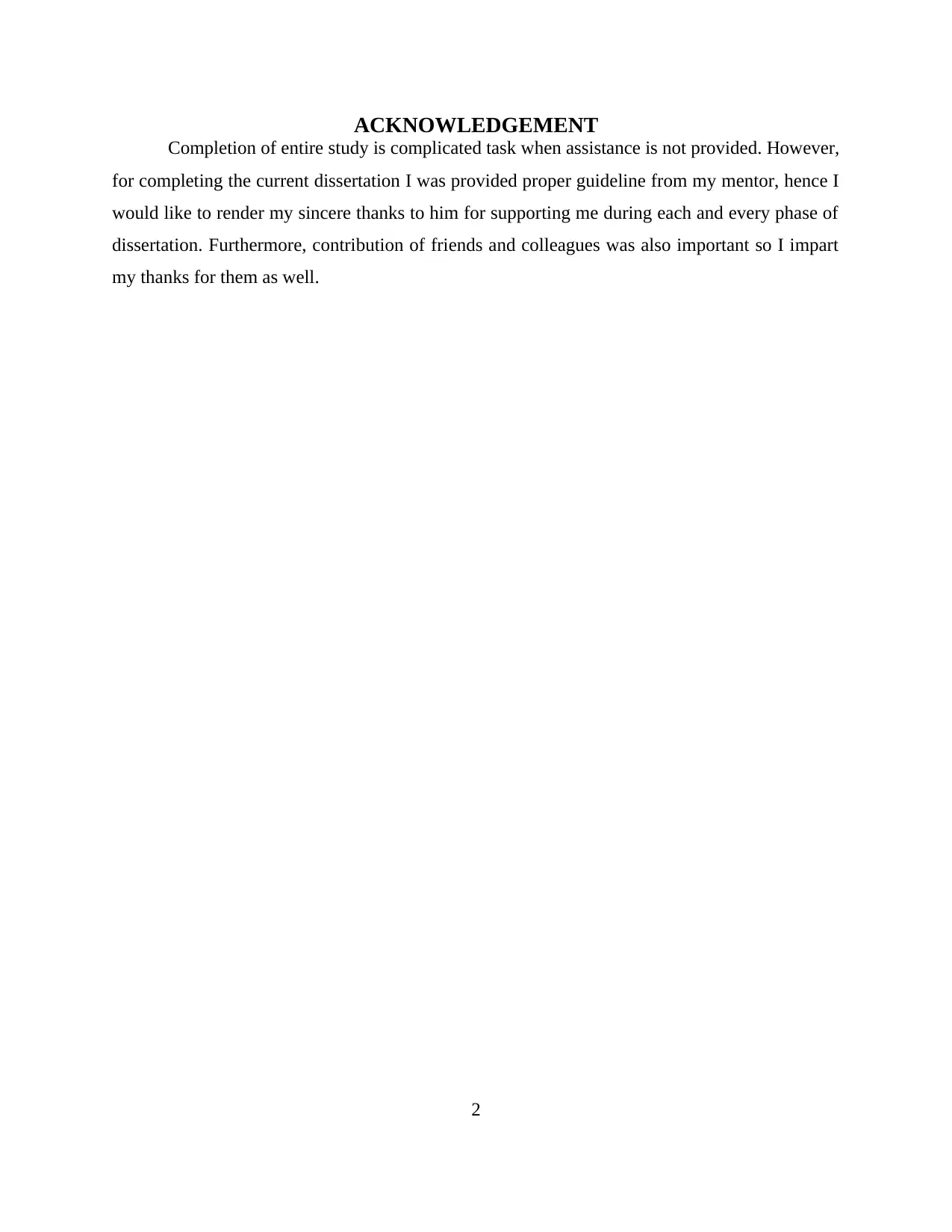
ACKNOWLEDGEMENT
Completion of entire study is complicated task when assistance is not provided. However,
for completing the current dissertation I was provided proper guideline from my mentor, hence I
would like to render my sincere thanks to him for supporting me during each and every phase of
dissertation. Furthermore, contribution of friends and colleagues was also important so I impart
my thanks for them as well.
2
Completion of entire study is complicated task when assistance is not provided. However,
for completing the current dissertation I was provided proper guideline from my mentor, hence I
would like to render my sincere thanks to him for supporting me during each and every phase of
dissertation. Furthermore, contribution of friends and colleagues was also important so I impart
my thanks for them as well.
2
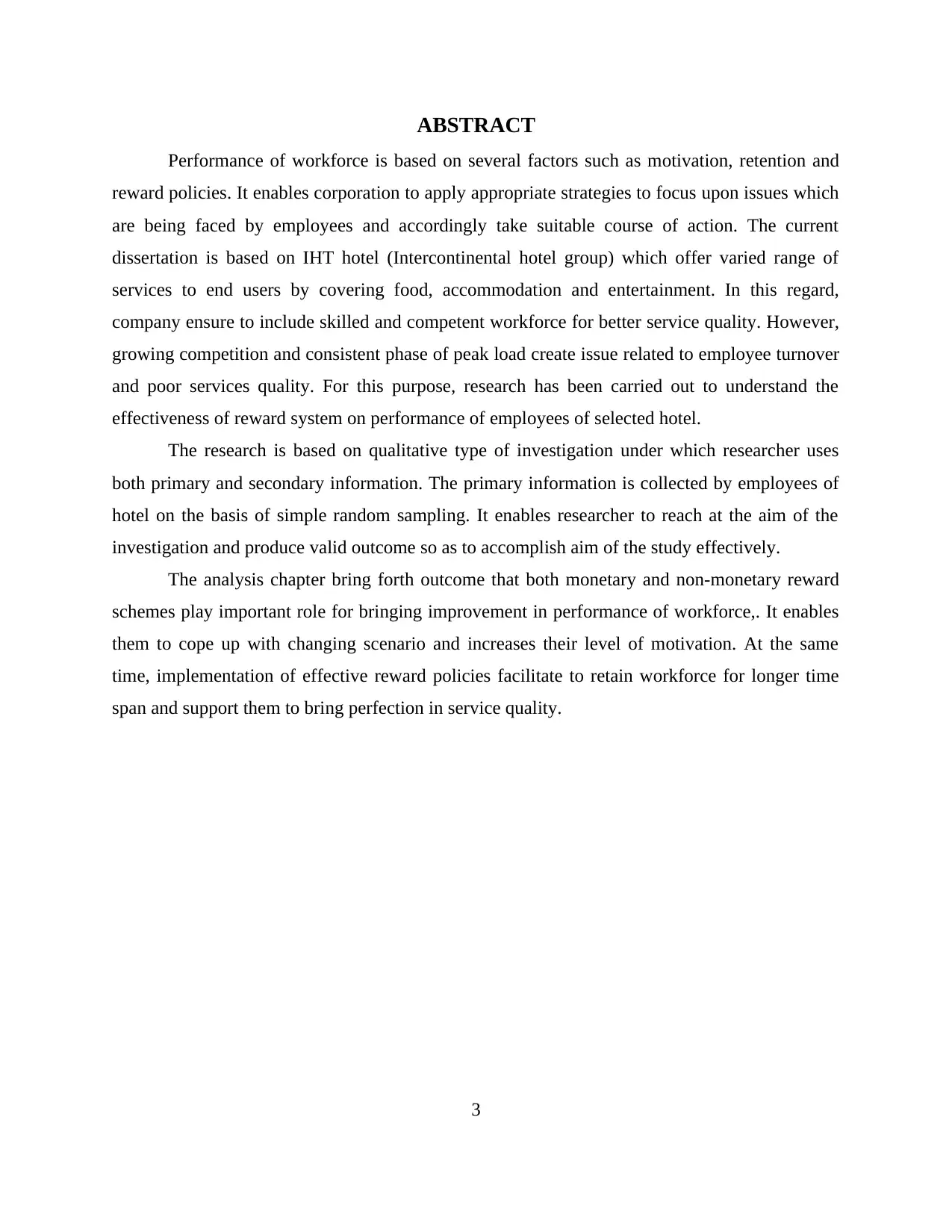
ABSTRACT
Performance of workforce is based on several factors such as motivation, retention and
reward policies. It enables corporation to apply appropriate strategies to focus upon issues which
are being faced by employees and accordingly take suitable course of action. The current
dissertation is based on IHT hotel (Intercontinental hotel group) which offer varied range of
services to end users by covering food, accommodation and entertainment. In this regard,
company ensure to include skilled and competent workforce for better service quality. However,
growing competition and consistent phase of peak load create issue related to employee turnover
and poor services quality. For this purpose, research has been carried out to understand the
effectiveness of reward system on performance of employees of selected hotel.
The research is based on qualitative type of investigation under which researcher uses
both primary and secondary information. The primary information is collected by employees of
hotel on the basis of simple random sampling. It enables researcher to reach at the aim of the
investigation and produce valid outcome so as to accomplish aim of the study effectively.
The analysis chapter bring forth outcome that both monetary and non-monetary reward
schemes play important role for bringing improvement in performance of workforce,. It enables
them to cope up with changing scenario and increases their level of motivation. At the same
time, implementation of effective reward policies facilitate to retain workforce for longer time
span and support them to bring perfection in service quality.
3
Performance of workforce is based on several factors such as motivation, retention and
reward policies. It enables corporation to apply appropriate strategies to focus upon issues which
are being faced by employees and accordingly take suitable course of action. The current
dissertation is based on IHT hotel (Intercontinental hotel group) which offer varied range of
services to end users by covering food, accommodation and entertainment. In this regard,
company ensure to include skilled and competent workforce for better service quality. However,
growing competition and consistent phase of peak load create issue related to employee turnover
and poor services quality. For this purpose, research has been carried out to understand the
effectiveness of reward system on performance of employees of selected hotel.
The research is based on qualitative type of investigation under which researcher uses
both primary and secondary information. The primary information is collected by employees of
hotel on the basis of simple random sampling. It enables researcher to reach at the aim of the
investigation and produce valid outcome so as to accomplish aim of the study effectively.
The analysis chapter bring forth outcome that both monetary and non-monetary reward
schemes play important role for bringing improvement in performance of workforce,. It enables
them to cope up with changing scenario and increases their level of motivation. At the same
time, implementation of effective reward policies facilitate to retain workforce for longer time
span and support them to bring perfection in service quality.
3
⊘ This is a preview!⊘
Do you want full access?
Subscribe today to unlock all pages.

Trusted by 1+ million students worldwide
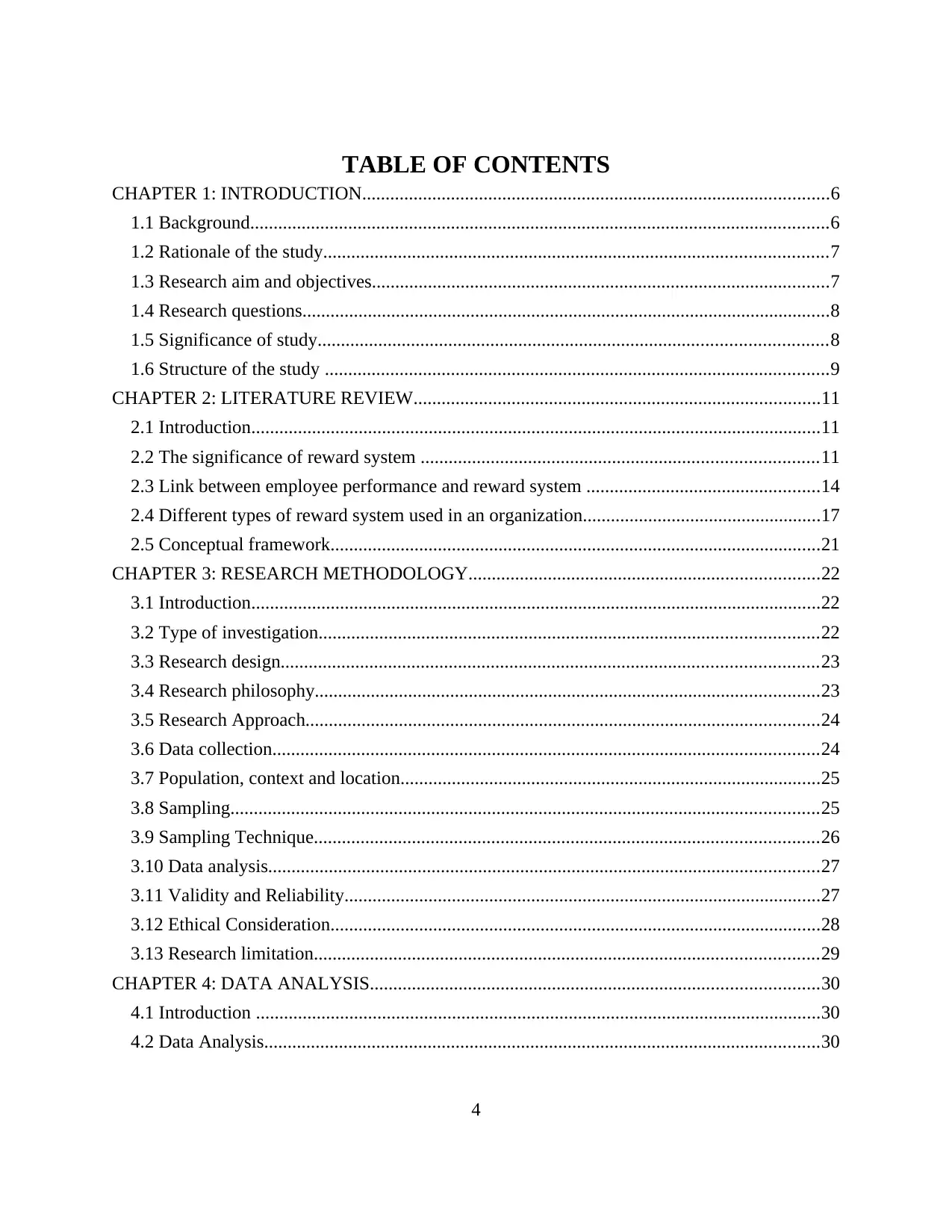
TABLE OF CONTENTS
CHAPTER 1: INTRODUCTION....................................................................................................6
1.1 Background............................................................................................................................6
1.2 Rationale of the study............................................................................................................7
1.3 Research aim and objectives..................................................................................................7
1.4 Research questions.................................................................................................................8
1.5 Significance of study.............................................................................................................8
1.6 Structure of the study ............................................................................................................9
CHAPTER 2: LITERATURE REVIEW.......................................................................................11
2.1 Introduction..........................................................................................................................11
2.2 The significance of reward system .....................................................................................11
2.3 Link between employee performance and reward system ..................................................14
2.4 Different types of reward system used in an organization...................................................17
2.5 Conceptual framework.........................................................................................................21
CHAPTER 3: RESEARCH METHODOLOGY...........................................................................22
3.1 Introduction..........................................................................................................................22
3.2 Type of investigation...........................................................................................................22
3.3 Research design...................................................................................................................23
3.4 Research philosophy............................................................................................................23
3.5 Research Approach..............................................................................................................24
3.6 Data collection.....................................................................................................................24
3.7 Population, context and location..........................................................................................25
3.8 Sampling..............................................................................................................................25
3.9 Sampling Technique............................................................................................................26
3.10 Data analysis......................................................................................................................27
3.11 Validity and Reliability......................................................................................................27
3.12 Ethical Consideration.........................................................................................................28
3.13 Research limitation............................................................................................................29
CHAPTER 4: DATA ANALYSIS................................................................................................30
4.1 Introduction .........................................................................................................................30
4.2 Data Analysis.......................................................................................................................30
4
CHAPTER 1: INTRODUCTION....................................................................................................6
1.1 Background............................................................................................................................6
1.2 Rationale of the study............................................................................................................7
1.3 Research aim and objectives..................................................................................................7
1.4 Research questions.................................................................................................................8
1.5 Significance of study.............................................................................................................8
1.6 Structure of the study ............................................................................................................9
CHAPTER 2: LITERATURE REVIEW.......................................................................................11
2.1 Introduction..........................................................................................................................11
2.2 The significance of reward system .....................................................................................11
2.3 Link between employee performance and reward system ..................................................14
2.4 Different types of reward system used in an organization...................................................17
2.5 Conceptual framework.........................................................................................................21
CHAPTER 3: RESEARCH METHODOLOGY...........................................................................22
3.1 Introduction..........................................................................................................................22
3.2 Type of investigation...........................................................................................................22
3.3 Research design...................................................................................................................23
3.4 Research philosophy............................................................................................................23
3.5 Research Approach..............................................................................................................24
3.6 Data collection.....................................................................................................................24
3.7 Population, context and location..........................................................................................25
3.8 Sampling..............................................................................................................................25
3.9 Sampling Technique............................................................................................................26
3.10 Data analysis......................................................................................................................27
3.11 Validity and Reliability......................................................................................................27
3.12 Ethical Consideration.........................................................................................................28
3.13 Research limitation............................................................................................................29
CHAPTER 4: DATA ANALYSIS................................................................................................30
4.1 Introduction .........................................................................................................................30
4.2 Data Analysis.......................................................................................................................30
4
Paraphrase This Document
Need a fresh take? Get an instant paraphrase of this document with our AI Paraphraser
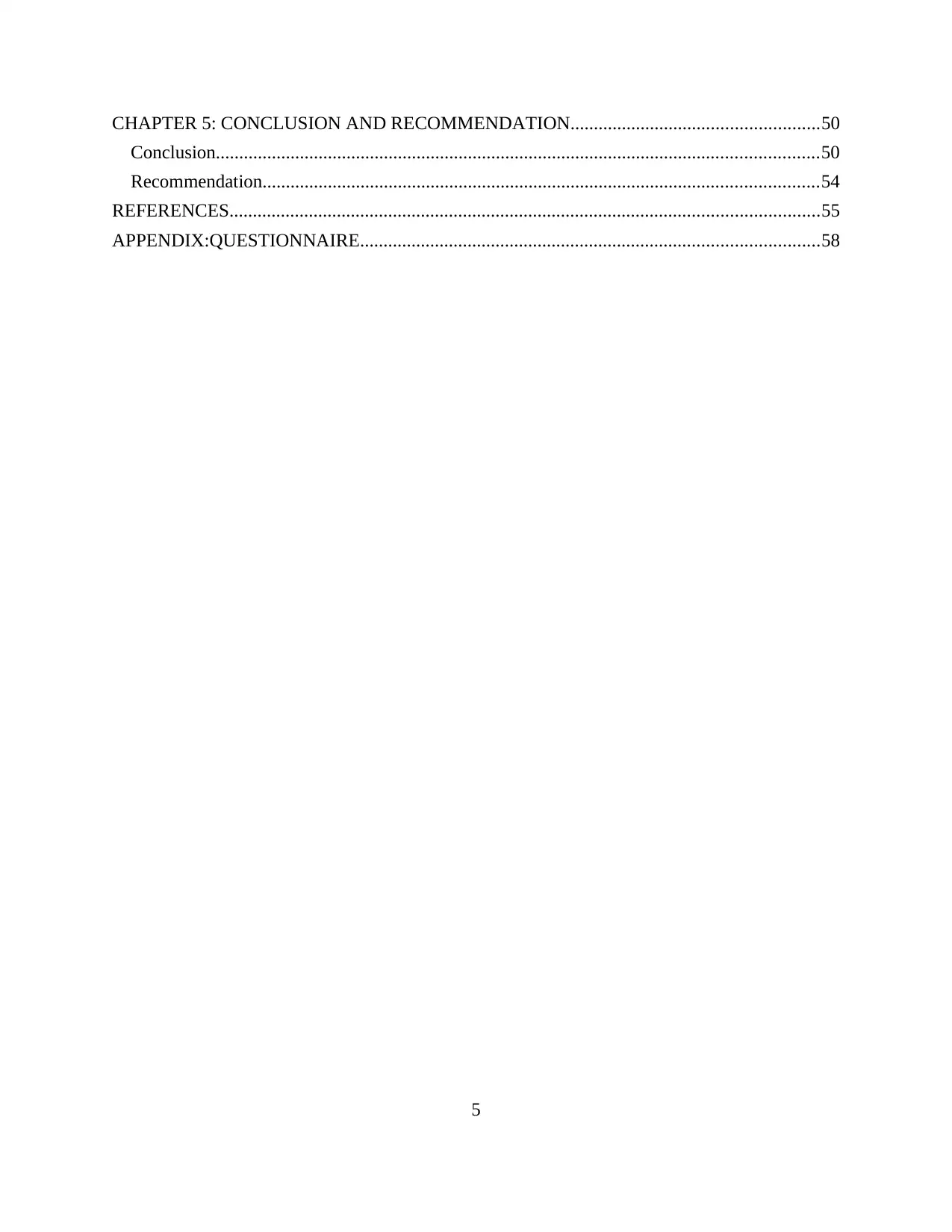
CHAPTER 5: CONCLUSION AND RECOMMENDATION.....................................................50
Conclusion.................................................................................................................................50
Recommendation.......................................................................................................................54
REFERENCES..............................................................................................................................55
APPENDIX:QUESTIONNAIRE..................................................................................................58
5
Conclusion.................................................................................................................................50
Recommendation.......................................................................................................................54
REFERENCES..............................................................................................................................55
APPENDIX:QUESTIONNAIRE..................................................................................................58
5
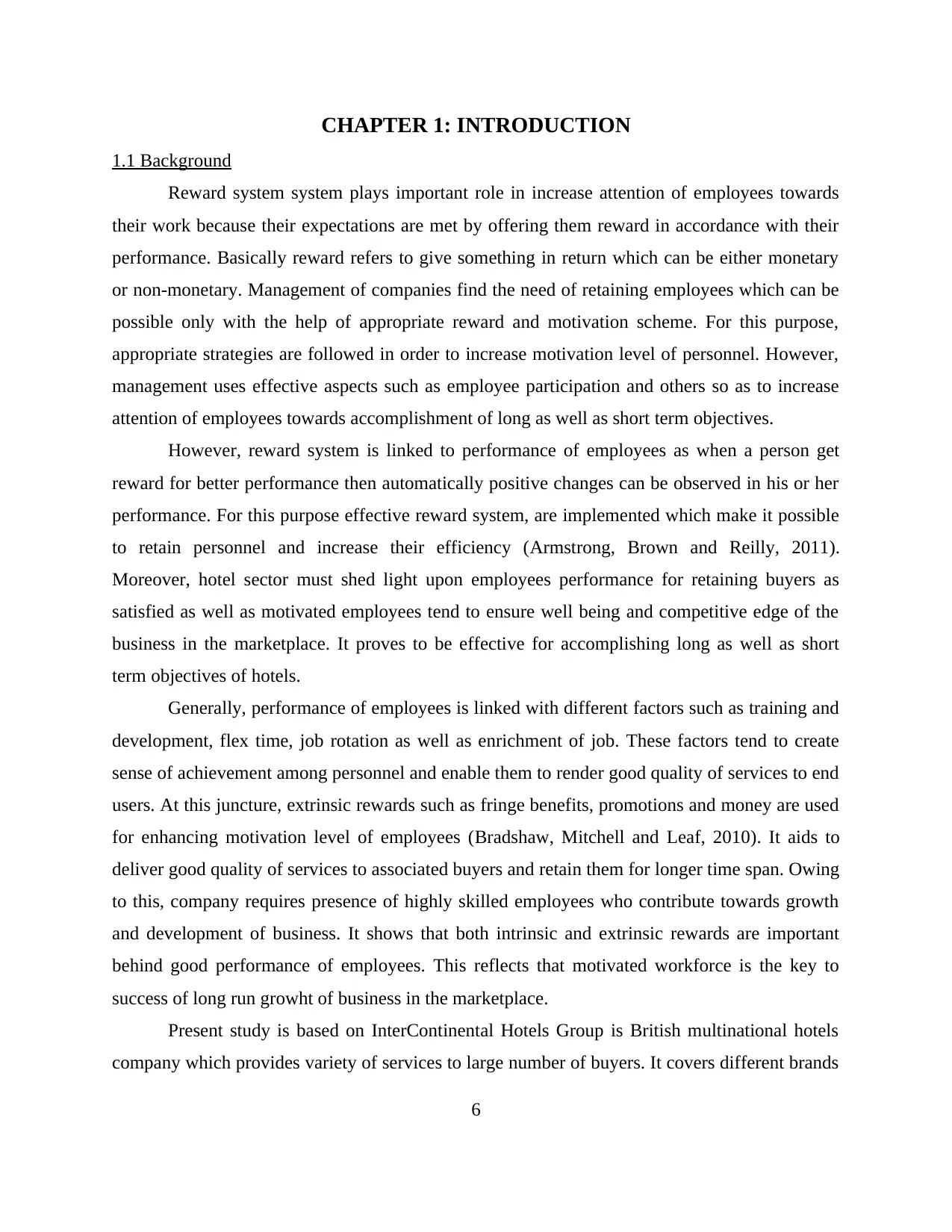
CHAPTER 1: INTRODUCTION
1.1 Background
Reward system system plays important role in increase attention of employees towards
their work because their expectations are met by offering them reward in accordance with their
performance. Basically reward refers to give something in return which can be either monetary
or non-monetary. Management of companies find the need of retaining employees which can be
possible only with the help of appropriate reward and motivation scheme. For this purpose,
appropriate strategies are followed in order to increase motivation level of personnel. However,
management uses effective aspects such as employee participation and others so as to increase
attention of employees towards accomplishment of long as well as short term objectives.
However, reward system is linked to performance of employees as when a person get
reward for better performance then automatically positive changes can be observed in his or her
performance. For this purpose effective reward system, are implemented which make it possible
to retain personnel and increase their efficiency (Armstrong, Brown and Reilly, 2011).
Moreover, hotel sector must shed light upon employees performance for retaining buyers as
satisfied as well as motivated employees tend to ensure well being and competitive edge of the
business in the marketplace. It proves to be effective for accomplishing long as well as short
term objectives of hotels.
Generally, performance of employees is linked with different factors such as training and
development, flex time, job rotation as well as enrichment of job. These factors tend to create
sense of achievement among personnel and enable them to render good quality of services to end
users. At this juncture, extrinsic rewards such as fringe benefits, promotions and money are used
for enhancing motivation level of employees (Bradshaw, Mitchell and Leaf, 2010). It aids to
deliver good quality of services to associated buyers and retain them for longer time span. Owing
to this, company requires presence of highly skilled employees who contribute towards growth
and development of business. It shows that both intrinsic and extrinsic rewards are important
behind good performance of employees. This reflects that motivated workforce is the key to
success of long run growht of business in the marketplace.
Present study is based on InterContinental Hotels Group is British multinational hotels
company which provides variety of services to large number of buyers. It covers different brands
6
1.1 Background
Reward system system plays important role in increase attention of employees towards
their work because their expectations are met by offering them reward in accordance with their
performance. Basically reward refers to give something in return which can be either monetary
or non-monetary. Management of companies find the need of retaining employees which can be
possible only with the help of appropriate reward and motivation scheme. For this purpose,
appropriate strategies are followed in order to increase motivation level of personnel. However,
management uses effective aspects such as employee participation and others so as to increase
attention of employees towards accomplishment of long as well as short term objectives.
However, reward system is linked to performance of employees as when a person get
reward for better performance then automatically positive changes can be observed in his or her
performance. For this purpose effective reward system, are implemented which make it possible
to retain personnel and increase their efficiency (Armstrong, Brown and Reilly, 2011).
Moreover, hotel sector must shed light upon employees performance for retaining buyers as
satisfied as well as motivated employees tend to ensure well being and competitive edge of the
business in the marketplace. It proves to be effective for accomplishing long as well as short
term objectives of hotels.
Generally, performance of employees is linked with different factors such as training and
development, flex time, job rotation as well as enrichment of job. These factors tend to create
sense of achievement among personnel and enable them to render good quality of services to end
users. At this juncture, extrinsic rewards such as fringe benefits, promotions and money are used
for enhancing motivation level of employees (Bradshaw, Mitchell and Leaf, 2010). It aids to
deliver good quality of services to associated buyers and retain them for longer time span. Owing
to this, company requires presence of highly skilled employees who contribute towards growth
and development of business. It shows that both intrinsic and extrinsic rewards are important
behind good performance of employees. This reflects that motivated workforce is the key to
success of long run growht of business in the marketplace.
Present study is based on InterContinental Hotels Group is British multinational hotels
company which provides variety of services to large number of buyers. It covers different brands
6
⊘ This is a preview!⊘
Do you want full access?
Subscribe today to unlock all pages.

Trusted by 1+ million students worldwide
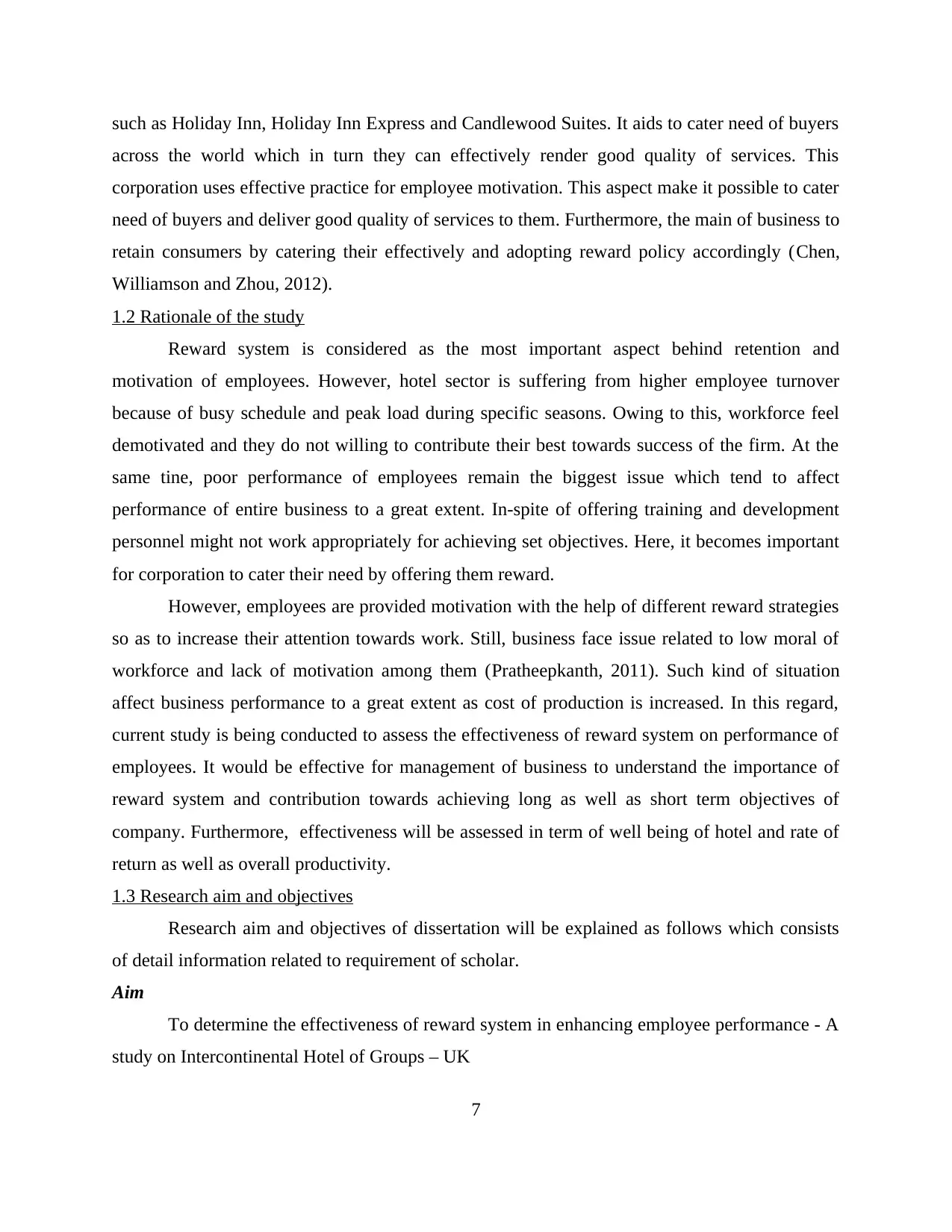
such as Holiday Inn, Holiday Inn Express and Candlewood Suites. It aids to cater need of buyers
across the world which in turn they can effectively render good quality of services. This
corporation uses effective practice for employee motivation. This aspect make it possible to cater
need of buyers and deliver good quality of services to them. Furthermore, the main of business to
retain consumers by catering their effectively and adopting reward policy accordingly (Chen,
Williamson and Zhou, 2012).
1.2 Rationale of the study
Reward system is considered as the most important aspect behind retention and
motivation of employees. However, hotel sector is suffering from higher employee turnover
because of busy schedule and peak load during specific seasons. Owing to this, workforce feel
demotivated and they do not willing to contribute their best towards success of the firm. At the
same tine, poor performance of employees remain the biggest issue which tend to affect
performance of entire business to a great extent. In-spite of offering training and development
personnel might not work appropriately for achieving set objectives. Here, it becomes important
for corporation to cater their need by offering them reward.
However, employees are provided motivation with the help of different reward strategies
so as to increase their attention towards work. Still, business face issue related to low moral of
workforce and lack of motivation among them (Pratheepkanth, 2011). Such kind of situation
affect business performance to a great extent as cost of production is increased. In this regard,
current study is being conducted to assess the effectiveness of reward system on performance of
employees. It would be effective for management of business to understand the importance of
reward system and contribution towards achieving long as well as short term objectives of
company. Furthermore, effectiveness will be assessed in term of well being of hotel and rate of
return as well as overall productivity.
1.3 Research aim and objectives
Research aim and objectives of dissertation will be explained as follows which consists
of detail information related to requirement of scholar.
Aim
To determine the effectiveness of reward system in enhancing employee performance - A
study on Intercontinental Hotel of Groups – UK
7
across the world which in turn they can effectively render good quality of services. This
corporation uses effective practice for employee motivation. This aspect make it possible to cater
need of buyers and deliver good quality of services to them. Furthermore, the main of business to
retain consumers by catering their effectively and adopting reward policy accordingly (Chen,
Williamson and Zhou, 2012).
1.2 Rationale of the study
Reward system is considered as the most important aspect behind retention and
motivation of employees. However, hotel sector is suffering from higher employee turnover
because of busy schedule and peak load during specific seasons. Owing to this, workforce feel
demotivated and they do not willing to contribute their best towards success of the firm. At the
same tine, poor performance of employees remain the biggest issue which tend to affect
performance of entire business to a great extent. In-spite of offering training and development
personnel might not work appropriately for achieving set objectives. Here, it becomes important
for corporation to cater their need by offering them reward.
However, employees are provided motivation with the help of different reward strategies
so as to increase their attention towards work. Still, business face issue related to low moral of
workforce and lack of motivation among them (Pratheepkanth, 2011). Such kind of situation
affect business performance to a great extent as cost of production is increased. In this regard,
current study is being conducted to assess the effectiveness of reward system on performance of
employees. It would be effective for management of business to understand the importance of
reward system and contribution towards achieving long as well as short term objectives of
company. Furthermore, effectiveness will be assessed in term of well being of hotel and rate of
return as well as overall productivity.
1.3 Research aim and objectives
Research aim and objectives of dissertation will be explained as follows which consists
of detail information related to requirement of scholar.
Aim
To determine the effectiveness of reward system in enhancing employee performance - A
study on Intercontinental Hotel of Groups – UK
7
Paraphrase This Document
Need a fresh take? Get an instant paraphrase of this document with our AI Paraphraser
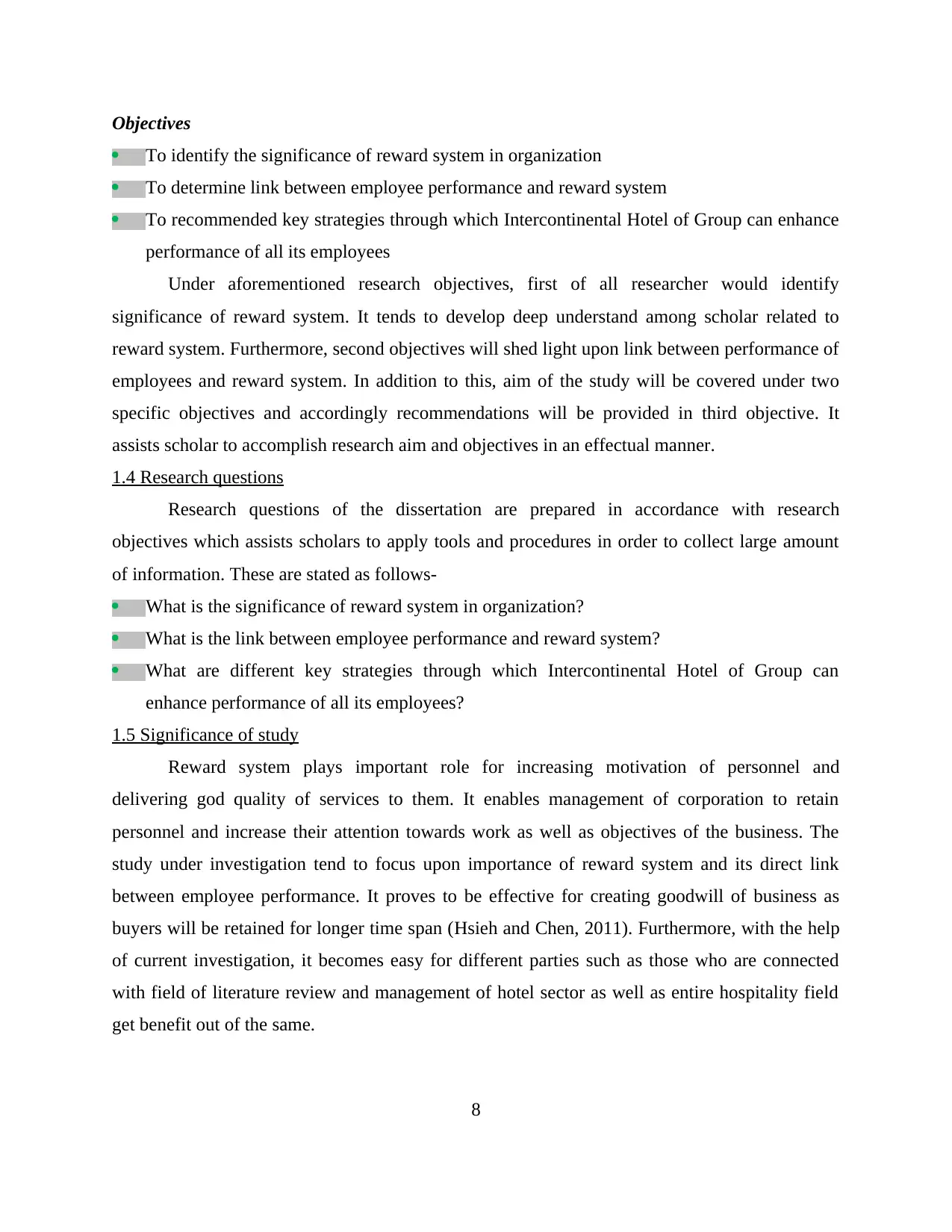
Objectives
To identify the significance of reward system in organization
To determine link between employee performance and reward system
To recommended key strategies through which Intercontinental Hotel of Group can enhance
performance of all its employees
Under aforementioned research objectives, first of all researcher would identify
significance of reward system. It tends to develop deep understand among scholar related to
reward system. Furthermore, second objectives will shed light upon link between performance of
employees and reward system. In addition to this, aim of the study will be covered under two
specific objectives and accordingly recommendations will be provided in third objective. It
assists scholar to accomplish research aim and objectives in an effectual manner.
1.4 Research questions
Research questions of the dissertation are prepared in accordance with research
objectives which assists scholars to apply tools and procedures in order to collect large amount
of information. These are stated as follows-
What is the significance of reward system in organization?
What is the link between employee performance and reward system?
What are different key strategies through which Intercontinental Hotel of Group can
enhance performance of all its employees?
1.5 Significance of study
Reward system plays important role for increasing motivation of personnel and
delivering god quality of services to them. It enables management of corporation to retain
personnel and increase their attention towards work as well as objectives of the business. The
study under investigation tend to focus upon importance of reward system and its direct link
between employee performance. It proves to be effective for creating goodwill of business as
buyers will be retained for longer time span (Hsieh and Chen, 2011). Furthermore, with the help
of current investigation, it becomes easy for different parties such as those who are connected
with field of literature review and management of hotel sector as well as entire hospitality field
get benefit out of the same.
8
To identify the significance of reward system in organization
To determine link between employee performance and reward system
To recommended key strategies through which Intercontinental Hotel of Group can enhance
performance of all its employees
Under aforementioned research objectives, first of all researcher would identify
significance of reward system. It tends to develop deep understand among scholar related to
reward system. Furthermore, second objectives will shed light upon link between performance of
employees and reward system. In addition to this, aim of the study will be covered under two
specific objectives and accordingly recommendations will be provided in third objective. It
assists scholar to accomplish research aim and objectives in an effectual manner.
1.4 Research questions
Research questions of the dissertation are prepared in accordance with research
objectives which assists scholars to apply tools and procedures in order to collect large amount
of information. These are stated as follows-
What is the significance of reward system in organization?
What is the link between employee performance and reward system?
What are different key strategies through which Intercontinental Hotel of Group can
enhance performance of all its employees?
1.5 Significance of study
Reward system plays important role for increasing motivation of personnel and
delivering god quality of services to them. It enables management of corporation to retain
personnel and increase their attention towards work as well as objectives of the business. The
study under investigation tend to focus upon importance of reward system and its direct link
between employee performance. It proves to be effective for creating goodwill of business as
buyers will be retained for longer time span (Hsieh and Chen, 2011). Furthermore, with the help
of current investigation, it becomes easy for different parties such as those who are connected
with field of literature review and management of hotel sector as well as entire hospitality field
get benefit out of the same.
8
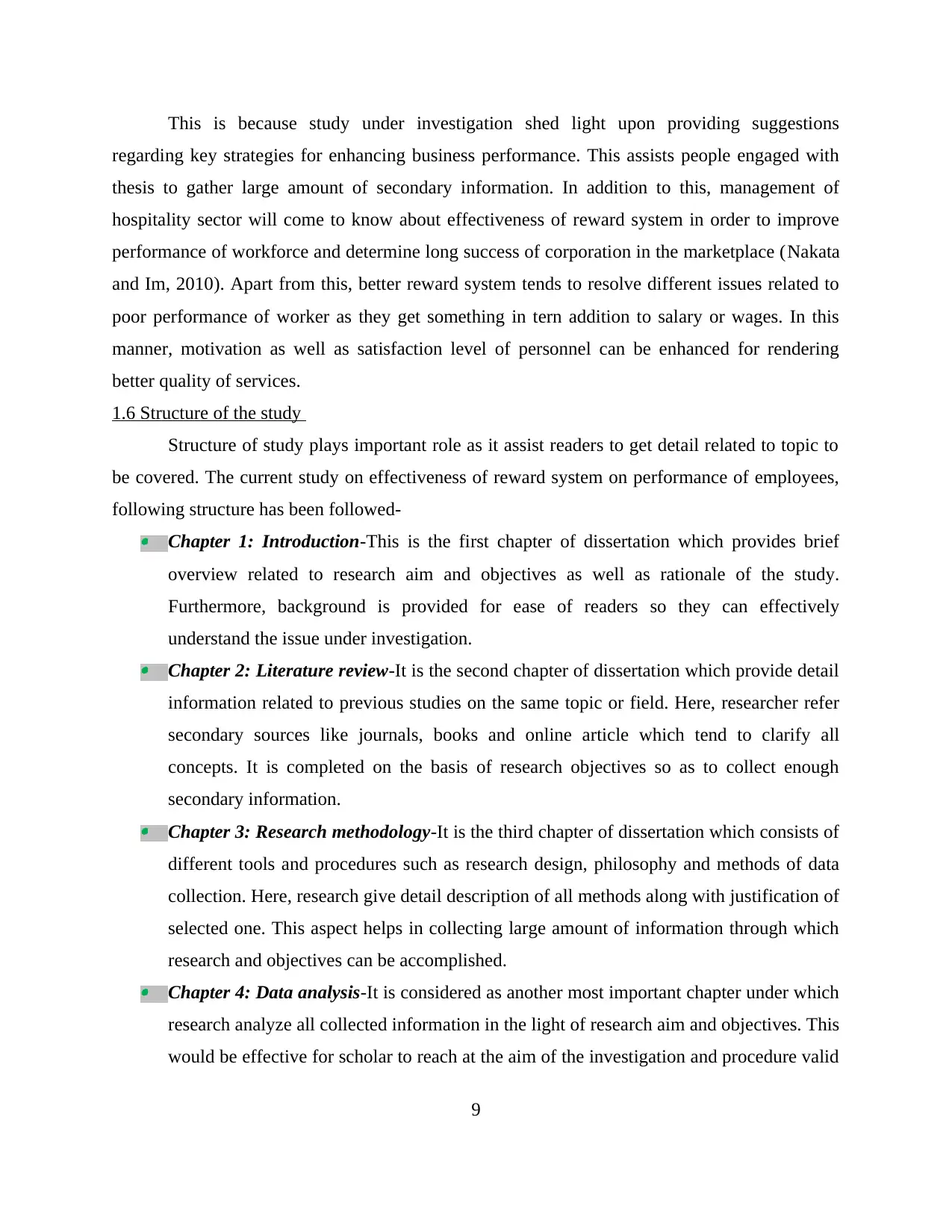
This is because study under investigation shed light upon providing suggestions
regarding key strategies for enhancing business performance. This assists people engaged with
thesis to gather large amount of secondary information. In addition to this, management of
hospitality sector will come to know about effectiveness of reward system in order to improve
performance of workforce and determine long success of corporation in the marketplace (Nakata
and Im, 2010). Apart from this, better reward system tends to resolve different issues related to
poor performance of worker as they get something in tern addition to salary or wages. In this
manner, motivation as well as satisfaction level of personnel can be enhanced for rendering
better quality of services.
1.6 Structure of the study
Structure of study plays important role as it assist readers to get detail related to topic to
be covered. The current study on effectiveness of reward system on performance of employees,
following structure has been followed- Chapter 1: Introduction-This is the first chapter of dissertation which provides brief
overview related to research aim and objectives as well as rationale of the study.
Furthermore, background is provided for ease of readers so they can effectively
understand the issue under investigation. Chapter 2: Literature review-It is the second chapter of dissertation which provide detail
information related to previous studies on the same topic or field. Here, researcher refer
secondary sources like journals, books and online article which tend to clarify all
concepts. It is completed on the basis of research objectives so as to collect enough
secondary information. Chapter 3: Research methodology-It is the third chapter of dissertation which consists of
different tools and procedures such as research design, philosophy and methods of data
collection. Here, research give detail description of all methods along with justification of
selected one. This aspect helps in collecting large amount of information through which
research and objectives can be accomplished. Chapter 4: Data analysis-It is considered as another most important chapter under which
research analyze all collected information in the light of research aim and objectives. This
would be effective for scholar to reach at the aim of the investigation and procedure valid
9
regarding key strategies for enhancing business performance. This assists people engaged with
thesis to gather large amount of secondary information. In addition to this, management of
hospitality sector will come to know about effectiveness of reward system in order to improve
performance of workforce and determine long success of corporation in the marketplace (Nakata
and Im, 2010). Apart from this, better reward system tends to resolve different issues related to
poor performance of worker as they get something in tern addition to salary or wages. In this
manner, motivation as well as satisfaction level of personnel can be enhanced for rendering
better quality of services.
1.6 Structure of the study
Structure of study plays important role as it assist readers to get detail related to topic to
be covered. The current study on effectiveness of reward system on performance of employees,
following structure has been followed- Chapter 1: Introduction-This is the first chapter of dissertation which provides brief
overview related to research aim and objectives as well as rationale of the study.
Furthermore, background is provided for ease of readers so they can effectively
understand the issue under investigation. Chapter 2: Literature review-It is the second chapter of dissertation which provide detail
information related to previous studies on the same topic or field. Here, researcher refer
secondary sources like journals, books and online article which tend to clarify all
concepts. It is completed on the basis of research objectives so as to collect enough
secondary information. Chapter 3: Research methodology-It is the third chapter of dissertation which consists of
different tools and procedures such as research design, philosophy and methods of data
collection. Here, research give detail description of all methods along with justification of
selected one. This aspect helps in collecting large amount of information through which
research and objectives can be accomplished. Chapter 4: Data analysis-It is considered as another most important chapter under which
research analyze all collected information in the light of research aim and objectives. This
would be effective for scholar to reach at the aim of the investigation and procedure valid
9
⊘ This is a preview!⊘
Do you want full access?
Subscribe today to unlock all pages.

Trusted by 1+ million students worldwide
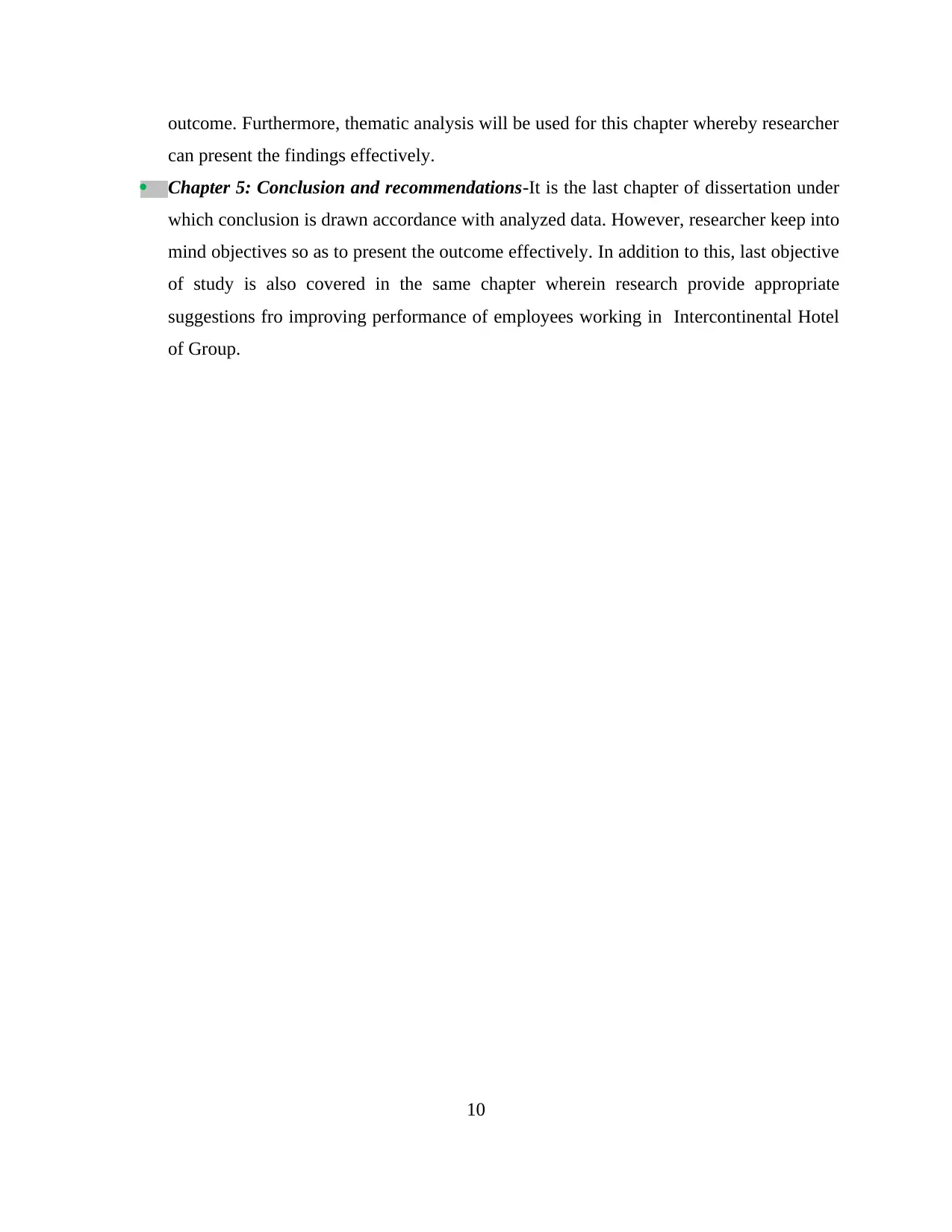
outcome. Furthermore, thematic analysis will be used for this chapter whereby researcher
can present the findings effectively.
Chapter 5: Conclusion and recommendations-It is the last chapter of dissertation under
which conclusion is drawn accordance with analyzed data. However, researcher keep into
mind objectives so as to present the outcome effectively. In addition to this, last objective
of study is also covered in the same chapter wherein research provide appropriate
suggestions fro improving performance of employees working in Intercontinental Hotel
of Group.
10
can present the findings effectively.
Chapter 5: Conclusion and recommendations-It is the last chapter of dissertation under
which conclusion is drawn accordance with analyzed data. However, researcher keep into
mind objectives so as to present the outcome effectively. In addition to this, last objective
of study is also covered in the same chapter wherein research provide appropriate
suggestions fro improving performance of employees working in Intercontinental Hotel
of Group.
10
Paraphrase This Document
Need a fresh take? Get an instant paraphrase of this document with our AI Paraphraser
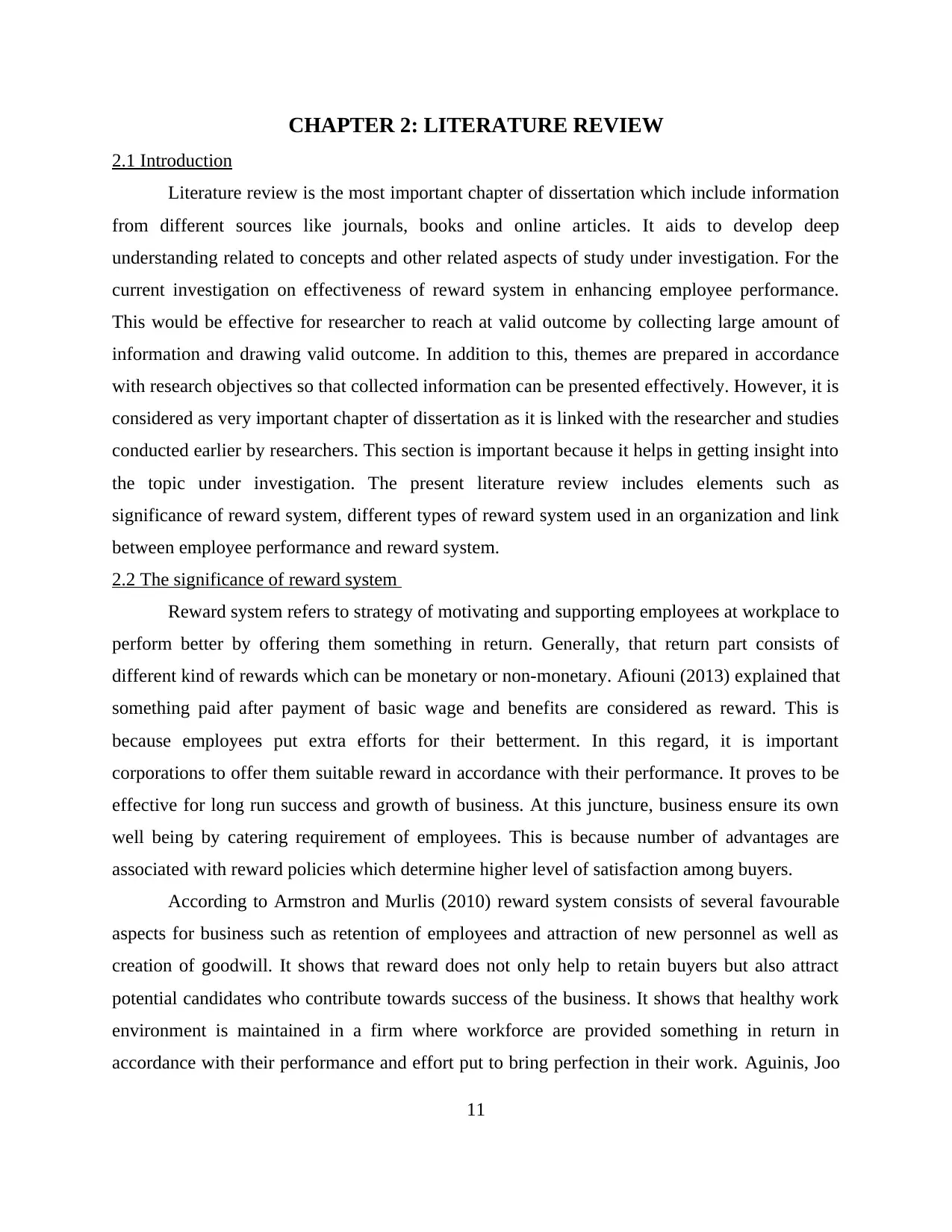
CHAPTER 2: LITERATURE REVIEW
2.1 Introduction
Literature review is the most important chapter of dissertation which include information
from different sources like journals, books and online articles. It aids to develop deep
understanding related to concepts and other related aspects of study under investigation. For the
current investigation on effectiveness of reward system in enhancing employee performance.
This would be effective for researcher to reach at valid outcome by collecting large amount of
information and drawing valid outcome. In addition to this, themes are prepared in accordance
with research objectives so that collected information can be presented effectively. However, it is
considered as very important chapter of dissertation as it is linked with the researcher and studies
conducted earlier by researchers. This section is important because it helps in getting insight into
the topic under investigation. The present literature review includes elements such as
significance of reward system, different types of reward system used in an organization and link
between employee performance and reward system.
2.2 The significance of reward system
Reward system refers to strategy of motivating and supporting employees at workplace to
perform better by offering them something in return. Generally, that return part consists of
different kind of rewards which can be monetary or non-monetary. Afiouni (2013) explained that
something paid after payment of basic wage and benefits are considered as reward. This is
because employees put extra efforts for their betterment. In this regard, it is important
corporations to offer them suitable reward in accordance with their performance. It proves to be
effective for long run success and growth of business. At this juncture, business ensure its own
well being by catering requirement of employees. This is because number of advantages are
associated with reward policies which determine higher level of satisfaction among buyers.
According to Armstron and Murlis (2010) reward system consists of several favourable
aspects for business such as retention of employees and attraction of new personnel as well as
creation of goodwill. It shows that reward does not only help to retain buyers but also attract
potential candidates who contribute towards success of the business. It shows that healthy work
environment is maintained in a firm where workforce are provided something in return in
accordance with their performance and effort put to bring perfection in their work. Aguinis, Joo
11
2.1 Introduction
Literature review is the most important chapter of dissertation which include information
from different sources like journals, books and online articles. It aids to develop deep
understanding related to concepts and other related aspects of study under investigation. For the
current investigation on effectiveness of reward system in enhancing employee performance.
This would be effective for researcher to reach at valid outcome by collecting large amount of
information and drawing valid outcome. In addition to this, themes are prepared in accordance
with research objectives so that collected information can be presented effectively. However, it is
considered as very important chapter of dissertation as it is linked with the researcher and studies
conducted earlier by researchers. This section is important because it helps in getting insight into
the topic under investigation. The present literature review includes elements such as
significance of reward system, different types of reward system used in an organization and link
between employee performance and reward system.
2.2 The significance of reward system
Reward system refers to strategy of motivating and supporting employees at workplace to
perform better by offering them something in return. Generally, that return part consists of
different kind of rewards which can be monetary or non-monetary. Afiouni (2013) explained that
something paid after payment of basic wage and benefits are considered as reward. This is
because employees put extra efforts for their betterment. In this regard, it is important
corporations to offer them suitable reward in accordance with their performance. It proves to be
effective for long run success and growth of business. At this juncture, business ensure its own
well being by catering requirement of employees. This is because number of advantages are
associated with reward policies which determine higher level of satisfaction among buyers.
According to Armstron and Murlis (2010) reward system consists of several favourable
aspects for business such as retention of employees and attraction of new personnel as well as
creation of goodwill. It shows that reward does not only help to retain buyers but also attract
potential candidates who contribute towards success of the business. It shows that healthy work
environment is maintained in a firm where workforce are provided something in return in
accordance with their performance and effort put to bring perfection in their work. Aguinis, Joo
11
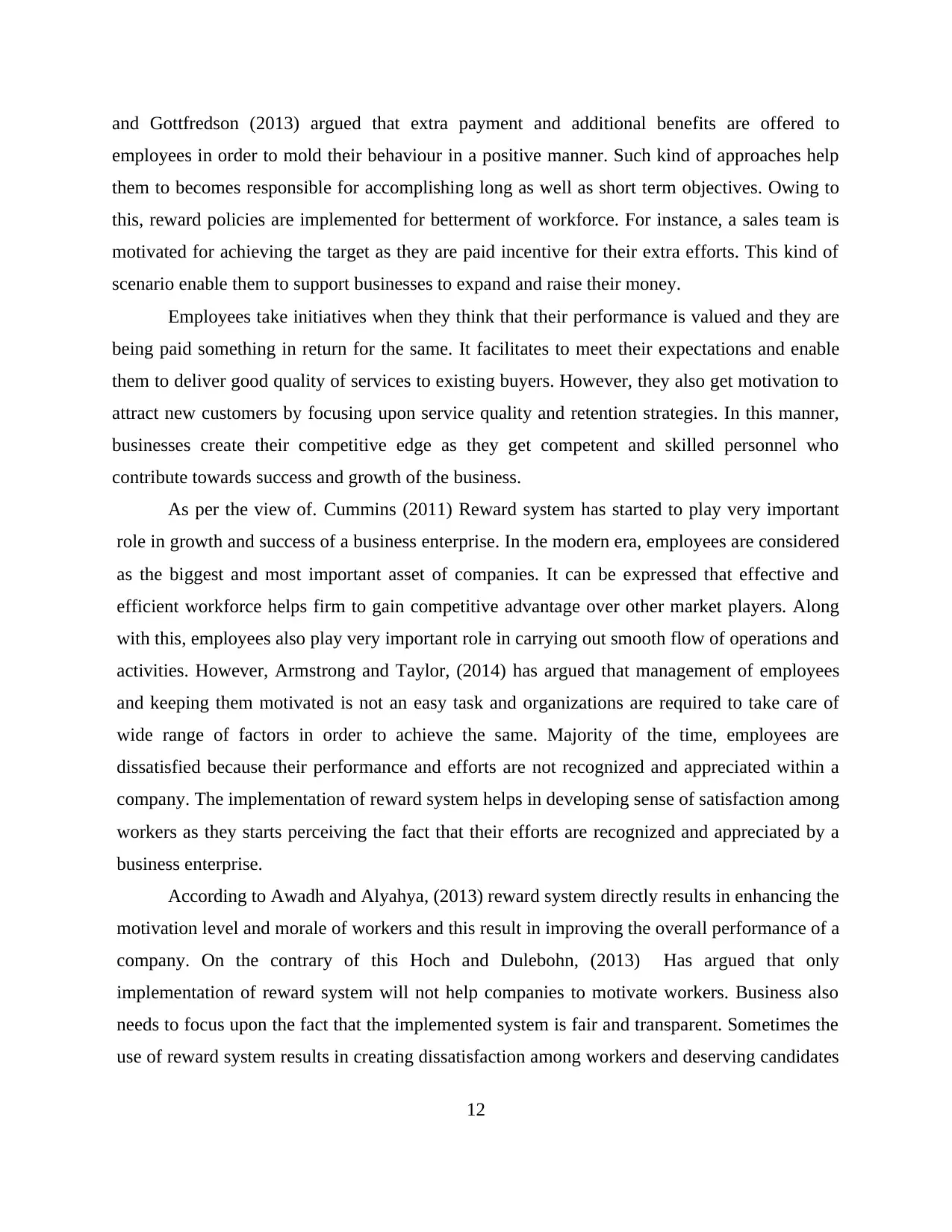
and Gottfredson (2013) argued that extra payment and additional benefits are offered to
employees in order to mold their behaviour in a positive manner. Such kind of approaches help
them to becomes responsible for accomplishing long as well as short term objectives. Owing to
this, reward policies are implemented for betterment of workforce. For instance, a sales team is
motivated for achieving the target as they are paid incentive for their extra efforts. This kind of
scenario enable them to support businesses to expand and raise their money.
Employees take initiatives when they think that their performance is valued and they are
being paid something in return for the same. It facilitates to meet their expectations and enable
them to deliver good quality of services to existing buyers. However, they also get motivation to
attract new customers by focusing upon service quality and retention strategies. In this manner,
businesses create their competitive edge as they get competent and skilled personnel who
contribute towards success and growth of the business.
As per the view of. Cummins (2011) Reward system has started to play very important
role in growth and success of a business enterprise. In the modern era, employees are considered
as the biggest and most important asset of companies. It can be expressed that effective and
efficient workforce helps firm to gain competitive advantage over other market players. Along
with this, employees also play very important role in carrying out smooth flow of operations and
activities. However, Armstrong and Taylor, (2014) has argued that management of employees
and keeping them motivated is not an easy task and organizations are required to take care of
wide range of factors in order to achieve the same. Majority of the time, employees are
dissatisfied because their performance and efforts are not recognized and appreciated within a
company. The implementation of reward system helps in developing sense of satisfaction among
workers as they starts perceiving the fact that their efforts are recognized and appreciated by a
business enterprise.
According to Awadh and Alyahya, (2013) reward system directly results in enhancing the
motivation level and morale of workers and this result in improving the overall performance of a
company. On the contrary of this Hoch and Dulebohn, (2013) Has argued that only
implementation of reward system will not help companies to motivate workers. Business also
needs to focus upon the fact that the implemented system is fair and transparent. Sometimes the
use of reward system results in creating dissatisfaction among workers and deserving candidates
12
employees in order to mold their behaviour in a positive manner. Such kind of approaches help
them to becomes responsible for accomplishing long as well as short term objectives. Owing to
this, reward policies are implemented for betterment of workforce. For instance, a sales team is
motivated for achieving the target as they are paid incentive for their extra efforts. This kind of
scenario enable them to support businesses to expand and raise their money.
Employees take initiatives when they think that their performance is valued and they are
being paid something in return for the same. It facilitates to meet their expectations and enable
them to deliver good quality of services to existing buyers. However, they also get motivation to
attract new customers by focusing upon service quality and retention strategies. In this manner,
businesses create their competitive edge as they get competent and skilled personnel who
contribute towards success and growth of the business.
As per the view of. Cummins (2011) Reward system has started to play very important
role in growth and success of a business enterprise. In the modern era, employees are considered
as the biggest and most important asset of companies. It can be expressed that effective and
efficient workforce helps firm to gain competitive advantage over other market players. Along
with this, employees also play very important role in carrying out smooth flow of operations and
activities. However, Armstrong and Taylor, (2014) has argued that management of employees
and keeping them motivated is not an easy task and organizations are required to take care of
wide range of factors in order to achieve the same. Majority of the time, employees are
dissatisfied because their performance and efforts are not recognized and appreciated within a
company. The implementation of reward system helps in developing sense of satisfaction among
workers as they starts perceiving the fact that their efforts are recognized and appreciated by a
business enterprise.
According to Awadh and Alyahya, (2013) reward system directly results in enhancing the
motivation level and morale of workers and this result in improving the overall performance of a
company. On the contrary of this Hoch and Dulebohn, (2013) Has argued that only
implementation of reward system will not help companies to motivate workers. Business also
needs to focus upon the fact that the implemented system is fair and transparent. Sometimes the
use of reward system results in creating dissatisfaction among workers and deserving candidates
12
⊘ This is a preview!⊘
Do you want full access?
Subscribe today to unlock all pages.

Trusted by 1+ million students worldwide
1 out of 61
Related Documents
Your All-in-One AI-Powered Toolkit for Academic Success.
+13062052269
info@desklib.com
Available 24*7 on WhatsApp / Email
![[object Object]](/_next/static/media/star-bottom.7253800d.svg)
Unlock your academic potential
Copyright © 2020–2026 A2Z Services. All Rights Reserved. Developed and managed by ZUCOL.





